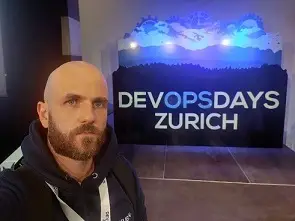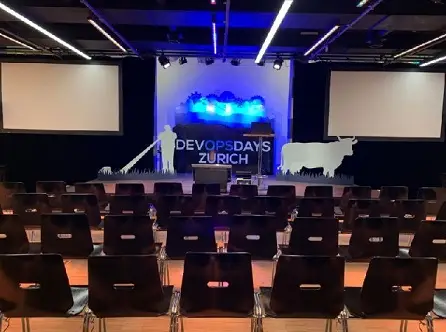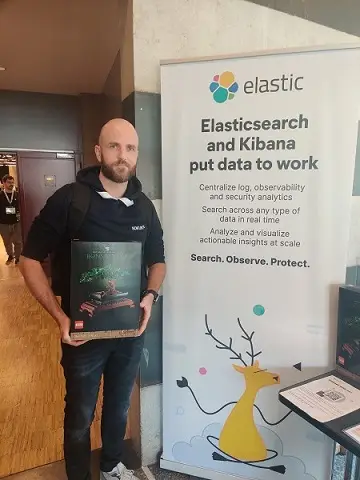By Lionel Gurret and Fabrice Vergnenègre.
DevOpsDays Zurich is a much-anticipated annual conference that brings together professionals from the DevOps community to share ideas, learn from one another, and explore the latest trends in technology. As avid attendees of last year’s event, we were thrilled to participate in this year’s conference, which spanned two days of inspiring talks, informative workshops, and engaging discussions.
In this blog post, we will be sharing our experience and insights from the conference. It will cover the event, summarizing the talks we attended, highlighting key takeaways, and offering our perspectives on the topics covered. Whether you were unable to attend DevOpsDays Zurich 2023 or simply want to revisit some of the highlights, we hope you’ll find these posts informatives and engaging.
So without further ado, let's dive in!

Laurence Kozera and Arjanna van der Plas, led a hands-on session on how to foster psychological safety in your team. The session covered the importance of psychological safety in high-performing teams and provided real-life examples on how to increase it, especially during remote or hybrid work and with diverse personalities or legacy tensions.

Ramón Medrano Llamas discusses best practices for communicating about reliability, especially during and after incidents. Reliability engineers have long practiced blameless retrospectives to learn from past incidents, but stakeholders outside of the operations team may not be so forgiving.

In this talk, Mey Beisaron shares her journey of transitioning from a backend developer to a DevOps Engineer role. She discusses the challenges she faced, including learning about the complex CI/CD pipeline and architecture of multiple systems. She explains how she transformed her problem-solving approach from a narrow application perspective to a wide holistic system architecture approach.
Raphaël Pinson‘s talk discusses the use of eBPF (extended Berkeley Packet Filter) to enhance observability in Linux systems. By using eBPF, he shows how it can bridge the gap between development and operations teams by providing deeper insights into the kernel and OS internals and the applications running on top. The talk also covers how eBPF can be used to extend observability downwards by accessing low-level system information and upwards by offering application-level tracing capabilities.

Dorota Parad‘s talk focused on how to manage workload effectively when there is always more work than time. She shared strategies for recognizing which tasks are worth prioritizing, learning when to say no, and avoiding getting trapped in a firefighting loop.

Thomas Krag‘s workshop covers essential leadership skills for engineers, tech leads, and managers. It offers practical tips on effective mentorship, using systems thinking, eliminating bottlenecks, measuring performance, influencing teams and individuals, and recruiting. The workshop is interactive and uses a Miro board, so attendees should bring their laptops.
Mark Heistek and Peter Nijenhuis have created a serious game to help individuals experience and understand the different phases of change resistance. In this workshop, participants will learn about the different stages of resistance, including insecurity, resistance, anger, joy, and happiness. The game is designed to help players shift from a fixed mindset to a growth mindset in less than an hour. Along with the game, participants will also receive background theory on the different phases of resistance.
By Alessandra Patti & Theo Roblot
This interactive session explores the concept of digital wellbeing, focusing on the impact of technology on our mental health. As experts in the digital space, the session leaders will guide participants through the potential triggers of social media and being constantly "available," and provide tips on how to navigate the digital world in a way that promotes wellbeing and prevents burnout.
For some people, DevOps is daily routine, for others it is still new ground. In this talk, Dr. Martin Wechsler talks about challenges of an IT organisation, and how Migros Group IT approaches DevOps.
Migros has adopted SAFe in its transformation. Devops culture "You build it, you run it" remain an essential leverage for Migros teams. There is no "Golden Path" or standard tools for teams, they’re free to chose their own tools. Communities of practices are the channel to share their practices and tools, but no enforcement is done.

After a great first day and few beers, we’re excited to dive into another day of insightful talks and engaging workshops. Last night’s evening event provided a wonderful opportunity to connect with fellow professionals in the DevOps community, and we’re looking forward to continuing those conversations throughout the day. Let’s jump right in!
In a keynote style talk, Justin Reock, Field CTO and Chief Evangelist at Gradle, discussed why Developer Productivity Engineering (DPE) is important for software engineering. He explained how DPE uses acceleration technologies and data analytics to speed up the software build and test process, improve developer efficiencies, and achieve faster feedback cycles. Reock also provided an overview of the key concepts and tools of DPE, the business impact on key objectives, the business case for DPE, and the role of AI/ML in DPE moving forward.
Wiktoria Dalach talked about the myths surrounding application security and how it is often perceived as difficult by developers. In her talk, she shared practical tips and the most useful pieces from the Application Security theory to make security less scary and not a boring topic.

Thomas Stein and Timon Schuele present the cloud native journey of SAP Cloud ALM, a SaaS solution with over 2000 customers and 250 developers. They discuss the importance of asking the right questions when creating a new cloud product, having the right core beliefs to reach the Elite-Level of DORA, and the benefits of a paved road of tools to speed up cloud transformation. The talk aims to emphasize that the software development process should be viewed as a system rather than just the sum of individual tools and processes.
The journey described by the presenters on how they moved from a legacy server-kind of deployment to regular delivery of applications. The biggest challenge, unsurprisingly, was changing the culture and having teams apply the famous devops mantra: "You build it, you run it".
Main enablers for their transformation:
Lesley Cordero‘s talk focuses on managing microservice architectures by building effective observable architectures using a standardized platform-focused approach. The talk discusses the challenges specific to microservices and how this approach addresses them by considering the patterns used, organizational support needed, and stack used.
An approach to provide a standardized observability plaftorm, based on 3 pillars:
Recommendations:
Marcel Britsch‘s talk is about the need for a new approach to compliance in product and service delivery. He discusses the shortcomings of traditional compliance methods and advocates for "compliance by design" or continuous compliance. Marcel presents a framework for continuous compliance throughout the entire product lifecycle and explains how involving compliance early and continuously can lead to better outcomes for products and compliance operations.

In this workshop, Ivan Pesenti guide participants in building a REST API to manage TODOs stored in a PostgreSQL database using Test-Driven Development. The workshop assumes some prior knowledge of HTTP concepts and REST APIs, experience with tests, programming with Go, Docker, and databases. The agenda of the workshop includes an introduction to TDD, HTTP, and database design, as well as practical exercises for building and testing the application. The workshop aims to provide participants with a hands-on experience of TDD and prepare them to use it in their future projects.
By Olivier Liechti – The Backstage project is a platform for building Developer Portals, designed to provide a single entry point into the enterprise software ecosystem. It offers a 360 view on software assets, from both a build and a run perspective. In this workshop, attendees gained a hands-on introduction to Backstage and learn about its core features, such as the software catalog, documentation as code system, and scaffolder, as well as its plugin architecture. The session also covered learnings from creating portals with clients, including technical issues and business benefits.
By Marc Herren– During this workshop, participants learned how to create a Gitlab CI pipeline from scratch and add a workflow to perform different steps on different branches. The goal was to create a fully functional pipeline that performs tests on merge requests, builds images on the main branch, scans images on the integration branch, and rolls out the image on the production branch. This will be accomplished by creating a version file of the frontend/backend image tag and reusing it in later stages.

DevOps Days Zurich 2023 was a great event where we learned a lot and got a glimpse of the latest trends in the industry. It was also a great opportunity to meet with our partners and network with other professionals.
Overall, it was an enriching experience and we look forward to attending similar events in the future!